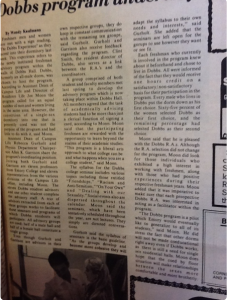I knew the word “sex” from a young age (I thought it was taboo to say that word out loud), but wouldn’t have been able to explain “the birds and the bees” until around 9th grade. My parents were also too self conscious and conservative to explain concepts like that to me and my siblings. At this age, I would have been considered asexual according to the bitchmagazine article. Prause and Graham define asexuality as a deficiency in sexual desire.
I don’t know if I would necessarily agree that kids are asexual because they don’t have an understanding of the “mechanics of life”. Rather, they are just ignorant, and that doesn’t correlate with asexuality. There are many arguments about which category children fall under. Of course, it is very difficult to quantify results like this when you don’t have a definitive explanation for the meaning of “sexuality” or results will vary based off the age of puberty and other biological/ environmental effects.
When reading the articles, the main thing that I got was that people (I’m focusing on the media in this case) can’t decide on the sexual or asexual nature of children. So they do the most logical thing, they bombard children with highly variable commercials. For instance we might see a steamy ad about cologne (which apparently needs topless men and women to get the point across) alongside a commercial about baby milk formula while showing a baby and the mother’s bosom.
Children are confused about sex. The media is like that ex that sends you mixed signals. I don’t know if the confusion is ever cleared, but after reading the 1986 Emory Report, I feel that Emory was very practical about teaching this. They were trying to remove the ignorance. RAs and coordinators were coached on appropriate discussions.
As awkward as talks can be, this is important. Some people can go their whole lives without being exposed to a natural biological process- reproduction is a way of maintaing the population, I think societies view on this topic needs to be reevaluated. Even the people who do have an understanding may not have been introduced to safe sex methods. Obviously Emory starting this program and the articles we read weren’t related, but it’s interesting seeing that our university had the foresight to see a problem (the articles were written in 2007 and 2012, Emory implemented the program in 1986).

Emory has taken steps to help the gay and lesbian community. I also think that our modern media will promote heterosexuality because it is the most widely accepted form of sexuality. I do not want to bring race up in a conversation about sexuality, but its the same reason the Prince of Persia was white. When most people have a norm the media will play towards it. If not, then they are trying a shock and awe technique. At the end of the day, its all about making money (media and Emory included). I honestly think its divide and conquer on all demographics. We may have varying beliefs on sex, religion, and politics, but he media will use all these differences and the emotions associated with them to make as much money as they can. perfect real world examples: chick-fil-a and target.
I can agree with your point on the media focusing on the monetary gains and Emory benefitting somehow. I disagree with race/ Prince of Persia example. I think a Persian actor would have been more tasteful, but we don’t know that the directors had hidden agendas. I think you’re overanalyzing and maybe they were just looking for an actor that US audiences would be familiar with. Regardless, it’s not that pertinent to this discussion, it just sidetracked me.
Sumo: your points about the taboo nature of sex are interesting. What might have motivated Emory to distribute or encourage sex education in the dorms at Emory, especially in the 80’s? I will give you a hint: Emory’s proximity to the CDC may have influenced this decision.
I am also intrigued by your discussion on sexuality and children. In many ways, it is contradictory that *many* (not just yours) parents do not talk to their kids about sexuality, about sex, about reproduction, I think with hopes that kids will then not have sex since they don’t really know how it works (which I think has proven to be faulty logic). These silences though are also silences about sexually transmitted diseases and infections and sexual violence. If a kid doesn’t know what healthy consensual sex is, they may not know what inappropriate and nonconsensual sex acts are either. At the same time they are bombarded through television, movies, commercials, the internet etc with highly sexualized images.